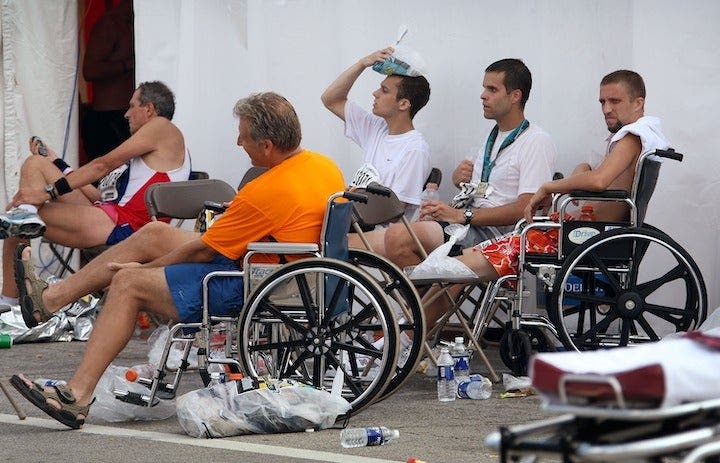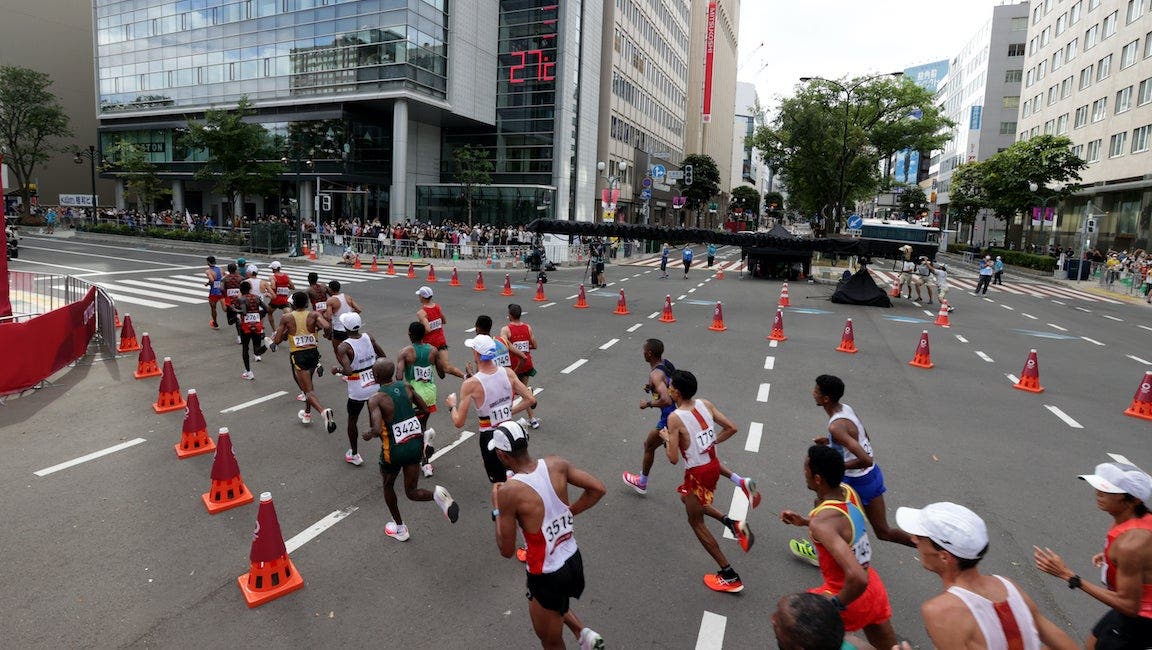The Last Summer Olympics Could Be Closer Than We Think

An athlete feels exhausted from hot temperatures during the Tokyo 2020 Olympic Games at Olympic Stadium on July 31, 2021 in Tokyo, Japan. (Photo: Elif Ozturk Ozgoncu/Anadolu Agency via Getty Images)
In my science fiction story “Morgan’s Run” I posited a globally warmed future in which a fictitious Fairbanks Marathon supplants Boston as the go-to race for the nation’s best recreational marathoners.
The story was written largely as humor, and the prediction wasn’t intended to be all that realistic. But a paper in the British medical journal The Lancet suggests that I might not actually have been all that far off the mark.
The Last Summer Olympics?
Bearing the provocative title “The Last Summer Olympics,” it was published midway through the Rio Olympics, possibly causing many readers to think it was (incorrectly) predicting that Rio would be the last Summer Olympics.
What it really posits is that as time wears on and climate continues to shift, Olympic venue options are going to become more and more constrained until eventually the choices are whittled down to such places as Siberia, Mongolia, Kyrgyzstan, Ireland, Scotland, and parts of Canada. After which, there will be no suitable venues left at all.
The last of the last: Glasgow, Edinburgh, Dublin and Belfast, the authors say. Not exactly the culture-spanning international festival of cities we have come to expect.
Nor was this simply some fly-by-night speculation. The lead author was Kirk R. Smith, a climate and health researcher at the University of California, Berkeley, who was part of the team that won the 2007 Nobel Peace Prize for their work with the Intergovernmental Panel on Climate Change (IPCC).
Kirk’s team drew on IPCC climate-change predictions, extrapolating them to 2085 for 645 potential host cities. They then looked to see which of these cities would have weather suitable for the marathon, the most heat-sensitive and iconic of all Olympic distance-running events, calculating where the weather would be likely to be too hot, humid, or sunbaked to make it safe to hold the race.
As examples of what could happen if authorities tried to run an event under excessively hot conditions, they pointed to the 2007 Chicago Marathon, which had to be cancelled midway through, after hundreds of heat-stricken runners flooded medical tents. And no, elites aren’t safe from such a fate. “In 2016,” Smith’s team noted, “only about 70% of the elite competition in the U.S. Olympic Team Trials Marathon in Los Angeles finished” — and there, temperatures peaked at only 25.6°C (78°F).

And by the standards of future marathons, that might be a walk in the park. In this year’s Japan Olympics, temperatures in the marathon approached 30°C (86°F) before, with vastly higher humidity than in Los Angeles.
To see how much chance there was of even worse weather disasters, Smith’s team looked at the probability that any given one of the 645 potential host cities would see starting line temperatures so hot, humid, and sunny that the race might need to be cancelled. If there was more than a 10 percent chance that one or the other of the races would draw a day hot enough for it to have to be cancelled, they considered the city unsuitable, and ruled it out.
One can argue about the cut-off level they used for safety (it appears that by their metric, the Tokyo Olympic women’s marathon would have been cancelled), but the results were pretty dramatic. Unless something is done to curb climate change, they found that by the 2080s, only 33 of these cities could safely host the Olympics by the 2080s, and all but a handful of them were in Northern Europe. (They reran the calculation only ruling out a city if the chances of an excessively hot day exceeded 25 percent, and saw 39 other cities make the cut, but I doubt that anyone really wants to invest in hosting the Olympics if there’s a 25 percent chance you’ll have to cancel for heat.)
How the “Summer” Olympics Could Still Be Saved from Climate Change
It’s a dire prediction, and it comes with a few caveats. First, due to difficulties with altitude acclimatization for athletes, Smith’s team ruled out cities at elevations above 1,600 meters (1 mile). I.e., no retreating to cooler elevations, such as Mexico City, or even Denver.
They also ruled out cities with populations smaller than that of Helsinki, Finland, the smallest city to host the Olympics since World War II. These days, they presumed, the cost and logistics of hosting the Summer Games were too much for smaller cities to bear.
They also didn’t predict what the Japanese did this year with the Tokyo Olympics, in moving the marathon 500 miles north to the (supposedly) cooler city of Sapporo. That still didn’t spare the runners from heat and humidity, but it was a good idea. Who knows, maybe someday the Olympic Marathon might really be in Fairbanks.

Another way to dodge heat is to move the “Summer” Olympics to the Southern Hemisphere as has been done twice, first in Melbourne, Australia in 1956, and then in Sydney in 2000.
But the simplest solution might be to rethink the timing of the “summer” games. Do they really have to be in July and August?
The first-ever of the modern games, in Athens, Greece, in 1896, were in April, and the first time Tokyo hosted them, in 1964, was in mid-October. The 1988 Mexico City Olympics were also in October.
Bottom line: climate change might indeed spell the heat death of the Summer Olympics as we currently know them. But maybe they will be replaced by something new: the Fall Olympics.